11 Ways America Was Still Backwards In 2013
As an immigrant, I'll be one of the first to say that living in America is pretty great.
But while we love our country, that doesn't mean that it's perfect. Far from it. For all the strides we've taken, there's always room for improvement. Here are 11 examples of why that improvement needs to happen, and fast.
1. The Government Affirmed Its Right To Spy On You
After NSA defector Ed Snowden revealed that the government has access to data from phone companies, most major internet companies and basically every inch of your digitized private life, the National Security Agency actually had the nerve to suggest that it's allowed to do all of that stuff. In a hearing before the U.S. Senate Judiciary Committee earlier this month, NSA Director Keith Alexander argued against imposing limits on government surveillance programs and also noted that the NSA has top level accountability procedures.
To be clear, limitless surveillance... is limitless surveillance. What Alexander is arguing is akin to suggesting that the government has the right to watch you at all times, no matter who you're with and what you're doing, and regardless of whether or not they have probable cause. Not only is this alarmingly creepy, it's also in violation of several constitutionally guaranteed rights. As for accountability, what good is accountability when it's internal, that is, only to the same folks who are perpetrating these actions in the first place? There's got to be hundreds of dystopian novels out there regarding a surveillance-related demise. And here we are...
2. Rape Is Everywhere... And Nowhere At The Same Time
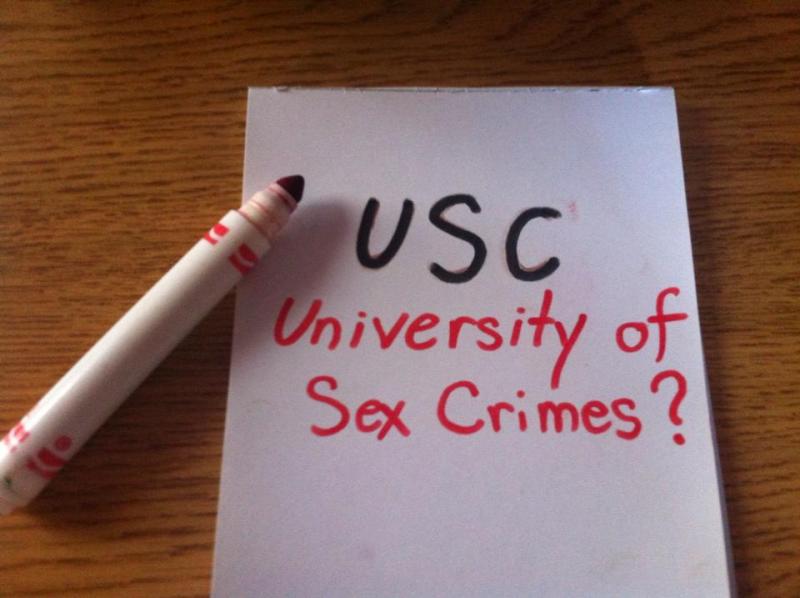
2013 was a pretty explosive year for rape. From rape allegations being swept under the rug on college campuses to sexual violence in video games, a courageous group of students, activists, journalists and everyday folks have blown the lid so hard off this issue, it's never getting screwed on again. The stories we've heard this year have been rough: teenage girls raped at parties and tormented with pictures of their assaults for months afterward, rapists given book reports as punishments for their actions, high school students expelled for "public lewdness" after reporting an assault. Unfortunately, these stories have been met with vitriol as much as they have been met with love and support, an experience I am not unfamiliar with, having published my own account of rape in May. And we almost never talk about male victims of rape.
All of this boils down to one major problem: in a country that didn't define marital rape (when someone forces their spouse to have sex with them against their will) as illegal until 1993, we are simply ill-equipped to understand what consensual sex, and therefore a denial of consent, actually is. To the point where the legitimacy of a rape is questioned because of what a woman was wearing, how flirtatious a person was or how much alcohol someone has consumed. To the point where we think it's normal that one gender has to be more cautious than another. To the point where young men are encouraged to touch young women on the dance floor without their explicit permission and yet expected not to repeat this same behavior with sex. The issue of rape deserves as much attention as the frequency with which it is happening. But there may be some setbacks, especially on the government side, because:
3. Only 18 Percent Of Congresspersons Are Women
My favorite justification for this is that women just aren’t interested in politics. Hmmm: could that be because women are socialized into deferring to male judgment? Because there’s such a huge lack of female political role models to start with? Because even when women do succeed in politics, the media still viciously critiques them for characteristics having nothing to do with their political career, such as their appearance and their married life?
Ironically enough, after winning wars against Iraq and Afghanistan, the U.S. imposed gender quotas on the legislatures of both countries, but for whatever reason (maybe because of all the rapes we’re not talking about?), we’ve never see sex discrimination as a big enough issue here at home to ever try instituting such a quota within our own borders. Now, don’t get me wrong: quotas have their advantages and disadvantages and it would take a lot more discussion to conclude whether or not such a system is truly right for America. But the fascinating result of all this is that the two countries we repeatedly slam for their barbaric treatment of women, whose barbaric treatment of women we used as justification for military campaigns which inadvertently killed tens of thousands more women, actually have a higher representation of women in national government than we do.
In any case, perhaps this low representation of women can help explain why...
4. Motherhood Causes Poverty

But where is the support for mothers in this country? Reproductive rights are consistently targeted—and aggressively limited, depending on which state you live in—giving women less choice of when they even become mothers. The U.S. is one of only a handful of countries without a paid maternity leave policy, meaning most women don’t get a single paid day off from work after giving birth to a child. Benefits for fathers aren’t any better, meaning there’s very little incentive for a father to take time off of work to help care for the child. And if a woman needs more than 12 weeks to recover from childbirth, there’s no guarantee she’ll get her job back, setting up a new mother for potential unemployment. Mothers are the primary breadwinner in 40 percent of U.S. families, and yet women nationally are making 23 percent less money than men. Even when you control for life choices, women make just 91 cents for every dollar earned by their male counterparts.
No wonder mothers are poor, a problem that isn't helped by the fact that:
5. Teens Aren't Talking To Their Doctors About Sex
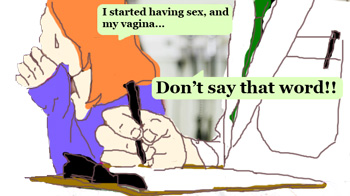
…even though, according to the Centers for Disease Control and Prevention (CDC), about half of all high-schoolers have had sexual intercourse. According to a study published Monday in “JAWA Pediatrics,” many doctors don’t bring up sexual health at all when receiving teenagers, and when they do, they’re spending an average of just 36 seconds on the topic. Lack of knowledge surrounding sex and sexual health seems to be a bigger problem than we think it is, when 3 in 10 young American women will get pregnant at least once before age 20 and 9.5 million adolescents and young adults are diagnosed with an STD each year.
Lack of sexual health education can also lead to ignorance of rape and sexual assault—an inability to perceive it when it’s happening and a lack of confidence to attempt to stop it when it does. A whopping nine percent of teenagers who responded to an online CDC survey admitted to having kissed, touched or done something sexual with another person when that person didn’t want them to. And get this: half of the perpetrators said the victim was completely responsible for the assault. This needs to change. Our priorities where teens and sex are concerned are badly askew: studies show that teenagers receiving some form of comprehensive sexual education are 60 percent less likely to get pregnant or to get someone else pregnant; yet 26 states still require that abstinence be the sole focus. We must seriously reevaluate our perspective if we are going to change these disturbing realities. But our attention may be otherwise occupied because:
6. Men's Rights Groups Are Getting Traction
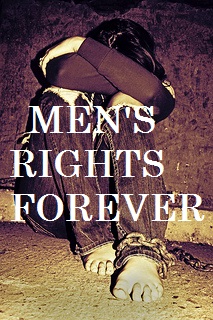
And to anyone who believes that women’s rights have gone too far, take a look at points 2, 3 and 4 and maybe reevaluate your position.
7. George Zimmerman Is A Free Man
In a trial which received news coverage as far away as the central African city in which I spent my summer, George Zimmerman was acquitted of second degree murder in the February shooting death of 17-year-old Trayvon Martin. Zimmerman made the decision to follow Martin for several blocks, under the guise of his participation in the Neighborhood Watch, even after he was explicitly asked by a 9-11 dispatcher not to do so. This then led to a confrontation with Martin, in which Zimmerman says he shot the unarmed teenager in self-defense. Martin’s death caused nationwide outrage and there was even talk by some members of Congress of charging Zimmerman with a racial hate crime. But the real culprit may be Florida’s vague “Stand Your Ground” statute, which effectively gives people the right to use deadly force against anyone they think might hurt them. How else could you make a legitimate argument in Zimmerman’s defense? George Zimmerman stalked an unarmed minor with a loaded gun. And then shot him. That’s called murder.
It remains extremely ironic to me that while George Zimmerman was excused from all wrongdoing as an aggressor after placing himself in a so-called dangerous situation (a situation so dangerous it apparently justified his use of force), women who are victims of rape continue to be blamed for the crimes committed against them because they “should have known better” (see #2).
8. Stop-and-Frisk Is Still Legal?
Just in case you don’t quite understand what kind of rights were sacrificed in this court decision, let’s put a cop’s uniform on Zimmerman for a minute. Let’s pretend he wasn’t just a member of the Neighborhood Watch (and, incidentally, hadn’t ignored an order to stop following the young Martin). Let’s say Trayvon Martin was this kid, a Harlem teenager detained multiple times on the same day for “looking suspicious.” Seventeen-year-old Alvin was stopped as part of the NYPD’s infamous “Stop And Frisk” program, which allows, and encourages, police officers to sop, question and search persons who “look suspicious,” particularly in high-crime areas. He was then harassed for having an open book bag, roughed up and threatened with arrest for “being a mutt.”
What if Alvin had resisted his unjust detention in a way that was deemed “violent” or threatening to the officer’s personal security? What if the cops had shot him in “self-defense,” even though they were the ones who initiated the confrontation in the first place? What if this happened in a wealthy suburban neighborhood as opposed to the streets of Harlem? If Martin’s death at the hands of some neighborhood hothead was deemed justifiable in a court of law, I can’t imagine what’s in store when it’s a police officer who pulls the trigger. Concerns about violations of our Second Amendment rights have made it legal for just about anyone to get their hands on a lethal weapon, but what about the Fourth Amendment? What about our right protecting us from unreasonable searches?
9. Racial Profiling Is The Norm
Of course, what makes Stop And Frisk particularly heinous is its inevitable link to the practice of racial profiling. According to the New York Civil Liberties Union, blacks and Latinos make up close to 90 percent of those stopped as part of the program; even in predominately white areas, the percentage of persons of color stopped remains disproportionately high. Los Angeles has its own history of racial profiling, a taste of which we all got a taste of in Neon Tommy’s own backyard, when 79 LAPD officers showed up to bust a USC graduation party organized by students of color while ignoring a rowdy house of mostly white students right across the street.
Profiling like this disempowers communities and leads to distrust of the police. Worse, it acts as a self-fulfilling prophecy. If people of color account for blank percent of stops, they will also account for a disproportionately high percentage of arrests, charges, convictions and prison populations, feeding into conceptions of people of color as criminals that make programs like Stop And Frisk so popular in the first place.
But for those supporting racial profiling: joke’s on you. Every violation experienced by a person of color or resident of a low-income neighborhood sets the precedent that the cops are allowed to abuse all of us, regardless of the color of our skin or the size of our paycheck. That doesn’t even get into the implications of racial profiling in regards to racism, which is unfortunately still very much alive and well because…
10. Three College Freshmen Clamped A Bike Lock Around Their Black Roommate's Neck
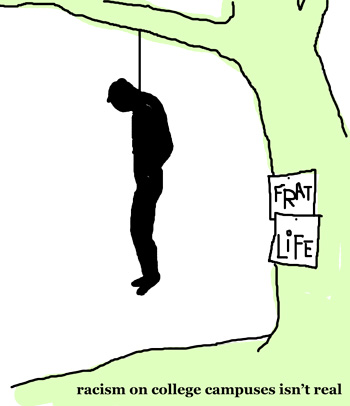
Three freshmen at San Jose State University were charged with a hate crime last month after they thought it would be funny to put a bike lock around their black roommate’s neck and plaster their four-bedroom suite with Nazi symbols, racial slurs and a Confederate flag. As much as we’d like to, we can’t pretend that racism is no longer a problem in our society or that it’s going to die out with the Civil Rights generation. In fact, racism remains prevalent among youth—even college-educated youth. This raises important questions of whether the educational and recreational environments we create for young people in this country are truly equal, especially when many people of color already say they feel alienated at institutions of higher learning.
As the sour cherry on top of their racist sundae, the three San Jose miscreants nicknamed their roommate “Three-Fifths,” a crude reference to the U.S. constitutional provision that defined a black slave as three-fifths of a person. But these kids aren’t the only ones misusing their historical education…
11. A Would-Be Politician Confused A Homophobe For Rosa Parks
“Duck Dynasty” star Phil Robertson was suspended from the popular A&E series for his remarks in a GQ interview comparing homosexuality to bestiality and suggesting that black people were happier under Jim Crow laws. I was under the impression that A&E made the right decision, but Congressional candidate Ian Bayne sure showed me: according to Bayne’s website, Robertson “took a stand against the persecution of Christians” and should be compared to Rosa Parks.
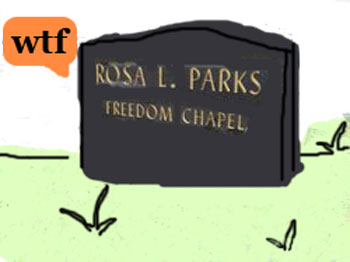
Aside from the fact that likening a defender of segregation law to one of the most famous anti-segregation activists in history is, well, absurd, Phil Robertson also happens to be on the opposing side of the great civil rights battle of our day: the rights of queer persons, including (though most certainly not limited to) the right to marry.
I understand that Bayne sees Robertson as a defender of religious freedom, but Robertson didn’t have his religious rights trampled on. He was suspended from his contract with a private company (AKA an entity that is not the government and therefore does not owe you the license to say whatever you want) for making discriminatory statements about homosexuals and blacks. Most of us would lose our jobs for doing much less. Meanwhile, Robertson’s comments expressed support for the actual repression of rights, hence why the Jim Crow laws were declared unconstitutional in the 1950s and 60s and why state courts are overturning same-sex marriage bans all over the place. Lucky for us, Bayne gave us a sneak preview of his stunning lack of American historical knowledge before he got elected to office. Then again, ignorance didn’t stop Todd Akin.
But hey...
Now that I've made you go through all of these horrible truths about living in America, I want to turn to a good thing about living in America for a minute.
In America, we have the right of free speech. We have the right to critique our peers and our government and the right to seek a solution when we think someone has done a wrong. Ours is a free country and we would be hard-pressed to give that up.
But that means, sometimes, we need to fight to ensure that it will still be free. Sometimes, we need to recognize the ways in which our nation is backwards and help it move in a positive direction again. We need to take heart and we need to have courage.
If we want a better 2014, we need to demand it.
Reach Senior Opinion Editor Francesca Bessey here; follow her here.



